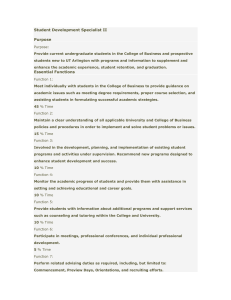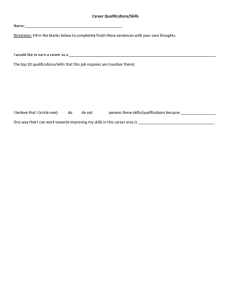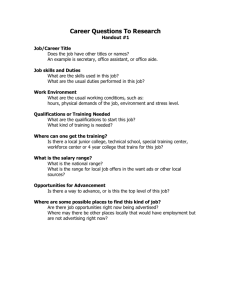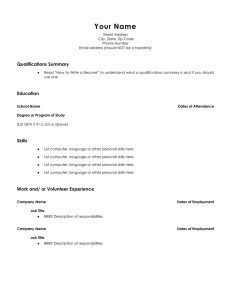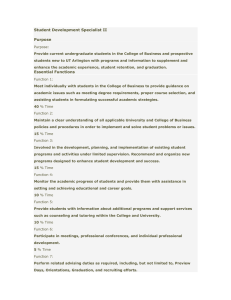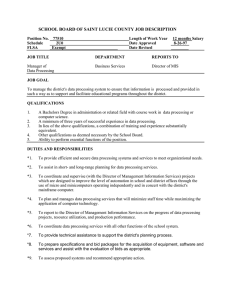UNIVERSITY OF COLORADO DENVER Position Number:
advertisement
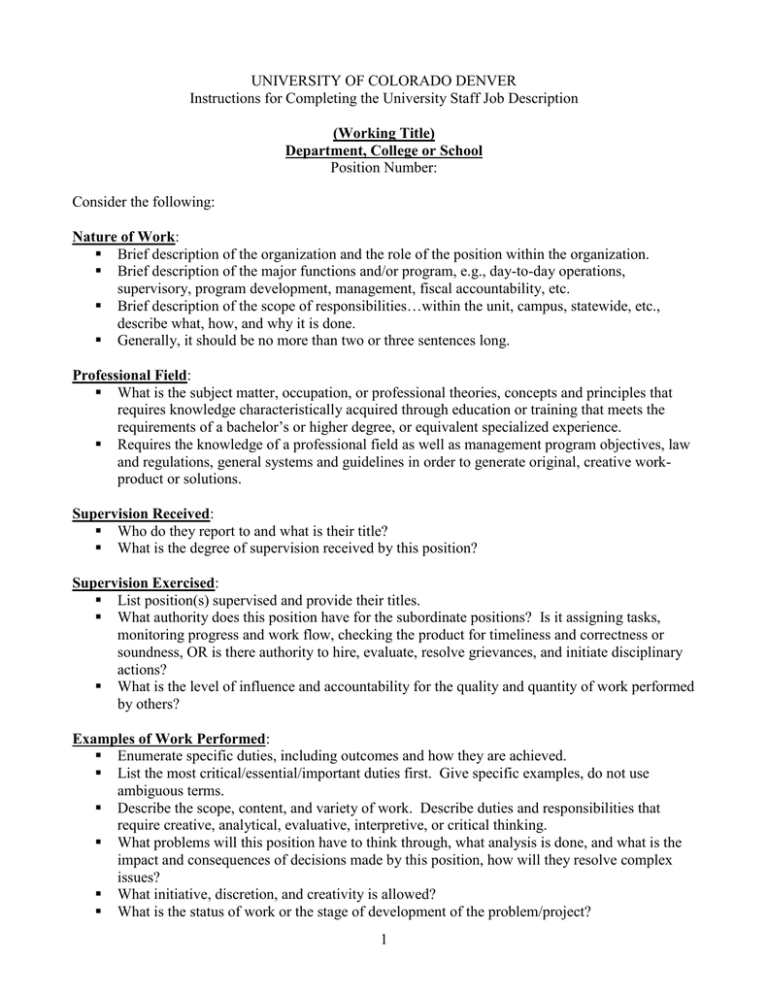
UNIVERSITY OF COLORADO DENVER Instructions for Completing the University Staff Job Description (Working Title) Department, College or School Position Number: Consider the following: Nature of Work: Brief description of the organization and the role of the position within the organization. Brief description of the major functions and/or program, e.g., day-to-day operations, supervisory, program development, management, fiscal accountability, etc. Brief description of the scope of responsibilities…within the unit, campus, statewide, etc., describe what, how, and why it is done. Generally, it should be no more than two or three sentences long. Professional Field: What is the subject matter, occupation, or professional theories, concepts and principles that requires knowledge characteristically acquired through education or training that meets the requirements of a bachelor’s or higher degree, or equivalent specialized experience. Requires the knowledge of a professional field as well as management program objectives, law and regulations, general systems and guidelines in order to generate original, creative workproduct or solutions. Supervision Received: Who do they report to and what is their title? What is the degree of supervision received by this position? Supervision Exercised: List position(s) supervised and provide their titles. What authority does this position have for the subordinate positions? Is it assigning tasks, monitoring progress and work flow, checking the product for timeliness and correctness or soundness, OR is there authority to hire, evaluate, resolve grievances, and initiate disciplinary actions? What is the level of influence and accountability for the quality and quantity of work performed by others? Examples of Work Performed: Enumerate specific duties, including outcomes and how they are achieved. List the most critical/essential/important duties first. Give specific examples, do not use ambiguous terms. Describe the scope, content, and variety of work. Describe duties and responsibilities that require creative, analytical, evaluative, interpretive, or critical thinking. What problems will this position have to think through, what analysis is done, and what is the impact and consequences of decisions made by this position, how will they resolve complex issues? What initiative, discretion, and creativity is allowed? What is the status of work or the stage of development of the problem/project? 1 Knowledge, Skills, and Abilities These are a list of unique qualifications and personal attributes that an individual must possess to be successful in this position. These will be used to assess the candidates how apply for this job. Knowledge: Generally there are two kinds of knowledge, factual and experiential knowledge. These statements refer to an organized body of information. Skills: These statements refer to the proficient manual, verbal, or mental manipulation of data or things. Ability: These statements refer to performing an observable activity. Talents: These statements refer to a recurring pattern of thought, feeling, or behavior that is productively applied. Consider three things when thinking about the best person for this position: Striving, or the ‘why’ of a person…why they are motivated; Thinking, or the ‘how’ of a person…how they think, weigh alternative, and come to decisions; Relating, or the ‘who’ of a person. Minimum Requirements: This is tied to the professional field outlined above…the formal education that reflects experience with professional standards, theories and concepts vs. on the job training. Generally positions require a Bachelor’s degree in addition to years of experience, based on the job level. Unless the work is very specific, it may be beneficial to use a broad range of related degrees to broaden the applicant pool. Use caution in substituting experience for the education. The experience must be comparable to professional work, not technical work. Preferred Qualifications: Preferred qualifications are used to separate out the highly qualified applicants from those who simply meet the required qualifications. These are the highly desired qualifications you can screen for on paper (i.e. experience, education or licensure) The more complete and descriptive these qualifications are, the easier it is for the search committee to determine the best applicants. Note: Administrative support or technical positions that are grant, gift, or auxiliary funded do not need to meet the professional standard described in this guide to be created as university staff positions. Positions are exempted from the state personnel system based on criteria established in statute and University policies and processes. These instructions are intended to explain the type of information needed in the job description to determine exemption eligibility and inform other aspects of the process. The content in these instructions do not guarantee, in any way, the exemption of a position. 2
